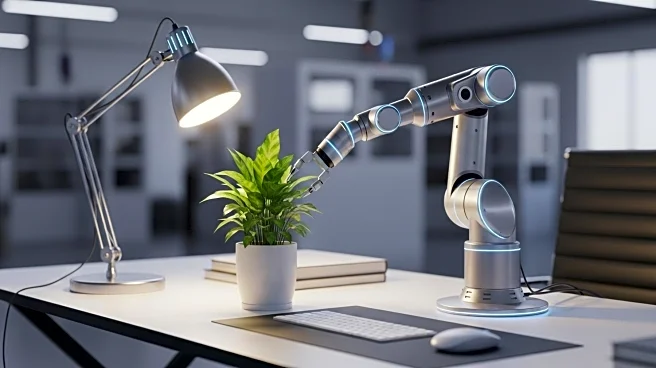What's Happening?
HR leaders are focusing on change management strategies to maintain productivity during the integration of artificial intelligence in manufacturing. The shift requires a dual focus on technology and human capabilities, as executives often prioritize technological advancements over the necessary human skills for AI adoption. Employees may resist changes due to fears of being replaced by technology. HR departments are bridging this gap by acting as consultants and coaches, fostering collaboration and shared goals. Real-world examples include Torani, a company that promotes a high-trust environment through profit-sharing and employee stock ownership, and Bosch, which has trained over 65,000 workers in AI since 2019.
Why It's Important?
The integration of AI in manufacturing is crucial for maintaining competitiveness and efficiency in the industry. HR strategies that focus on reskilling and upskilling employees are essential for successful AI adoption. Companies that invest in training are more likely to achieve positive outcomes, as demonstrated by Bosch's AI Academy. These efforts not only enhance productivity but also ensure job security and employee satisfaction, reducing resistance to technological changes. The collaboration between local governments, educational institutions, and manufacturers in Fresno, California, exemplifies how partnerships can create a skilled workforce ready for future technological demands.
What's Next?
Manufacturers are expected to continue investing in employee training and development to facilitate AI integration. HR leaders will likely expand their roles as change management consultants, focusing on psychological safety, trust, and transparency within teams. The success of these strategies may encourage other industries to adopt similar approaches, potentially leading to widespread changes in workforce management. As AI becomes more prevalent, ongoing collaboration between educational institutions and businesses will be crucial in preparing the next generation of workers for advanced technological roles.
Beyond the Headlines
The shift towards AI in manufacturing raises ethical considerations regarding job displacement and the need for equitable access to training opportunities. Companies must balance technological advancements with the well-being of their workforce, ensuring that employees are not left behind in the transition. The emphasis on psychological safety and trust highlights the importance of creating supportive work environments that prioritize employee engagement and satisfaction.









